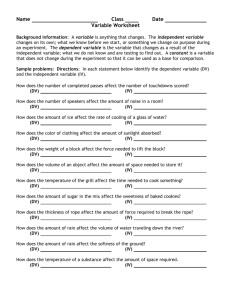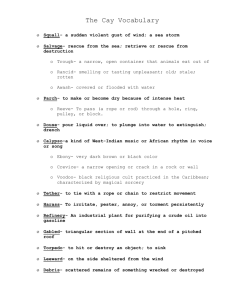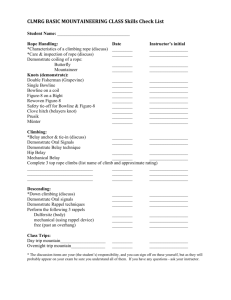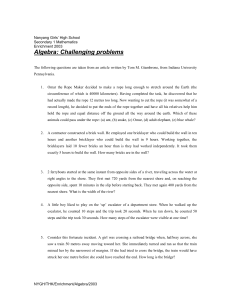Ropes Courses
advertisement
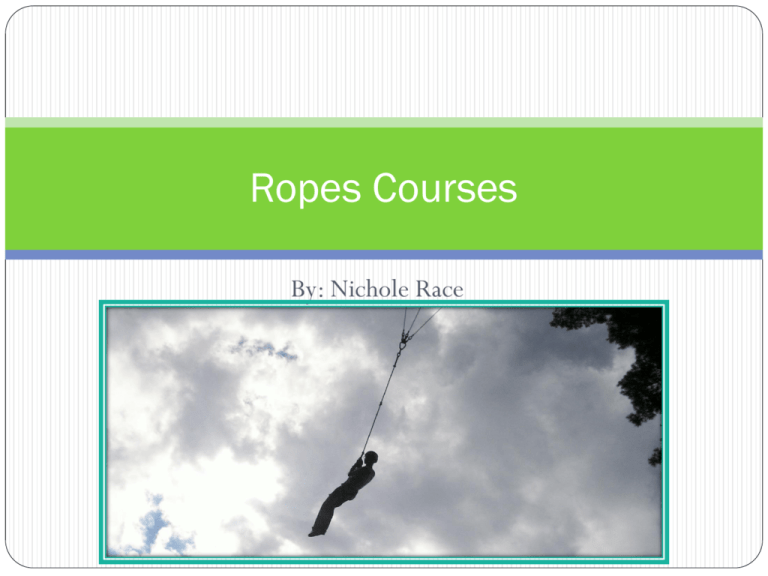
Ropes Courses By: Nichole Race Low Ropes Course Low rope course are a series of obstacles at ground level. Low rope courses are usually used for team building exercises. Some examples of low rope elements are trust falls, Whale Watch, and Tire Traverse Low rope elements vary on the amount of teamwork and leadership needed. In order to successfully complete a low rope element This low rope element involves much more individual work than teamwork. The goal is to get across the area without touching the ground by using the tires and other swings. I find this to be the most fun of all the low rope elements I have been on. Usually the group planning on participating is split in two. This is to ensure the safety of the group. While half the group is on the element, the other is spotting them from the ground. Example of Tire Traverse element Example of Whale Watch element This low rope element is all about balance. The end goal is get everyone in the group to be on the platform with it completely balanced. This much harder than it looks. The wall element is one of the hardest low rope elements. The wall is usually 8-10 feet tall. The goal of this element is to get everyone over the wall. One or two people are allowed to start on the platform behind the wall. They will be the ones pulling up the rest of the group. The people on the ground will hoist up their teammates and the people on the platform will pull them up safely to the platform. This element is easiest with a large group and gets harder with a small group. Example of a wall element High Rope Courses A high rope course is a series of obstacles and challenges that are completed far above the ground. High rope courses are both fun and challenging. They test a person strength and perseverance. The elements in each high ropes course vary, so you can try different things at each course. There are rules to completing a high rope course completely.You must make sure to wear the proper attire. Harness Carabineer Some High Rope Terminology Carabineer – An oblong, metal clip used for connecting ropes and harnesses together. Harness- A vital piece of equipment for rope climbing, to make sure the person climbing is safe and secure. Harnesses make sure that the climber sits upright at all times. Belay (belaying) – to secure the rope for the climber during their climb, preventing them from falling. Belayer- the person on the ground that controls the ropes friction, while another person is climbing. Climbing Tower element In order to reach the top of a climbing tower, you will first need to know how to get down from a climbing tower. You will need to learn how to rappel. To rappel down the climbing tower the climber must first make sure he or she is facing the wall. The climber should then tell the belayer that they are ready to come down. The belayer will then slowly release some of the rope. Then the climber needs to carefully kick off the climbing wall as the belayer releases more rope. The climber will then continue kicking off until he or she has reached the ground safely. Indiana Jones Element This is the hardest element I have ever been on. This element takes a lot of perseverance. You start by crossing a narrow bridge and then move on to balancing on a cable with only one rope for support. 2nd part of the Indiana Jones high ropes element. Big Swing high ropes element at Camp Oswegatchie. 1st part of the Indiana Jones high ropes element at Camp Oswegatchie. I was the 3rd person to completely cross both parts of this element. High ropes course at Howe Caverns in Howes Cave, NY. Rope Courses in New York State: There are several local high ropes course in New York state. Camp Oswegatchie in Croghan, NY www.oswegatchie.org RockVentures in Rochester, NY www. rockventures.net Wonder Works in Syracuse, NY www.wonderworksonline.com/destiny Adirondack Extreme Adventure Course in Bolton Landing, NY www.adirondackextreme.com Howe High Adventure at Howe Caverns in Howes Cave, NY www.howecaverns.com/howe-high-adventure/ropes-course Sources http://www.outdoorventures.us www.oswegatchie.org http://ropes.usu.edu/CourseInfo.cfm
